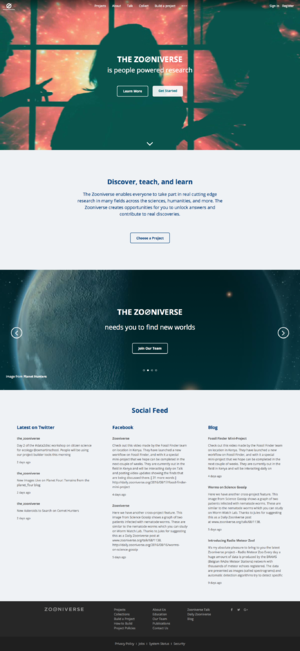Diferencia entre revisiones de «Zooniverse»
| Línea 37: | Línea 37: | ||
== <small>'''Entrevistas'''</small> == | == <small>'''Entrevistas'''</small> == | ||
| − | Darren McRoy http://dpya.org/wiki/index.php/ | + | Darren McRoy http://dpya.org/wiki/index.php/Entrevista_a_Darren_McRoy |
Lucy Fortson http://dpya.org/wiki/index.php/Lucy_Fortson | Lucy Fortson http://dpya.org/wiki/index.php/Lucy_Fortson | ||
Revisión actual del 05:41 1 dic 2021
Autodenifidos
What is the Zooniverse?
The Zooniverse is the world’s largest and most popular platform for people-powered research. This research is made possible by volunteers—hundreds of thousands of people around the world who come together to assist professional researchers. Our goal is to enable research that would not be possible, or practical, otherwise. Zooniverse research results in new discoveries, datasets useful to the wider research community, and many publications.
At the Zooniverse, anyone can be a researcher
You don’t need any specialised background, training, or expertise to participate in any Zooniverse projects. We make it easy for anyone to contribute to real academic research, on their own computer, at their own convenience.
You’ll be able to study authentic objects of interest gathered by researchers, like images of faraway galaxies, historical records and diaries, or videos of animals in their natural habitats. By answering simple questions about them, you’ll help contribute to our understanding of our world, our history, our Universe, and more.
With our wide-ranging and ever-expanding suite of projects, covering many disciplines and topics across the sciences and humanities, there's a place for anyone and everyone to explore, learn and have fun in the Zooniverse.
We accelerate important research by working together
The major challenge of 21st century research is dealing with the flood of information we can now collect about the world around us. Computers can help, but in many fields the human ability for pattern recognition—and our ability to be surprised—makes us superior. With the help of Zooniverse volunteers, researchers can analyze their information more quickly and accurately than would otherwise be possible, saving time and resources, advancing the ability of computers to do the same tasks, and leading to faster progress and understanding of the world, getting to exciting results more quickly.
Our projects combine contributions from many individual volunteers, relying on a version of the ‘wisdom of crowds’ to produce reliable and accurate data. By having many people look at the data we often can also estimate how likely we are to make an error. The product of a Zooniverse projects is often exactly what’s needed to make progress in many fields of research.
Volunteers and professionals make real discoveries together
Zooniverse projects are constructed with the aim of converting volunteers' efforts into measurable results. These projects have produced a large number of published research papers, as well as several open-source sets of analyzed data. In some cases, Zooniverse volunteers have even made completely unexpected and scientifically significant discoveries.
A significant amount of this research takes place on the Zooniverse discussion boards, where volunteers can work together with each other and with the research teams. These boards are integrated with each project to allow for everything from quick hashtagging to in-depth collaborative analysis. There is also a central Zooniverse board for general chat and discussion about Zooniverse-wide matters.
Many of the most interesting discoveries from Zooniverse projects have come from discussion between volunteers and researchers. We encourage all users to join the conversation on the discussion boards for more in-depth participation. (https://www.zooniverse.org/about)
Descripción
Es una iniciativa de ciencia ciudadana que conecta instituciones, académicos y voluntarios para desarrollar proyectos de astronomía, matemáticas, tecnología, estadística y programación, producido y mantenido por Citizen Science Alliance y sus oficinas centrales se encuentran en la Universidad de Oxford. Zooniverse inició en el 2007 con el proyecto Galaxy Zoo a partir del cual se desarrollaron investigaciones en temas variados como espacio, clima, humanidades, naturaleza, biología y física, involucrando a más de 1 millón de voluntarios alrededor del mundo identificados como “zooites”, quienes son apoyados y coordinados por traductores y embajadores encargados de promover los proyectos en cada país o región.
El portal alberga un laboratorio para proyectos experimentales con fines de investigación, una página de noticias en la que se muestran avances, curiosidades sobre los experimentos e investigaciones realizados y recursos pedagógicos. Galaxy Zoo Navigato sirve para clasificar galaxias e identificar sus características. Zoo Tolos que es un lugar donde los voluntarios observan, recopilan y analizan datos de proyectos de Zooniverse. Solar Storm Watch Resources For Teachers que es un sitio del observatorio de Greenwich con planeaciones de clases y recursos para profesores que quieran utilizar la herramienta con sus alumnos. Teachers Professional Development es un proyecto de entrenamiento y talleres para profesores, asesorado por el Zooniverse Education Team que junta especialistas en educación, astronomía y tecnología encargados de trabajar por el mejoramiento de la experiencia educativa del proyecto. Se produce además una sección de publicaciones con artículos científicos que pueden ser consultados por el público en general y un espacio en tiempo real que actualiza minuto a minuto los acontecimientos y resultados de los proyectos en todo el mundo denominado Zooniverse Live.
Entrevistas
Darren McRoy http://dpya.org/wiki/index.php/Entrevista_a_Darren_McRoy
Lucy Fortson http://dpya.org/wiki/index.php/Lucy_Fortson
Enlaces
URL: https://www.zooniverse.org/
Wayback Machine: https://web.archive.org/web/*/https://www.zooniverse.org/
Wikipedia: https://en.wikipedia.org/wiki/Zooniverse
